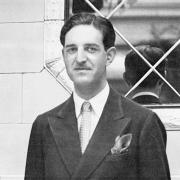This month marks the 75th anniversary of the D-Day landings. Emily Horton meets a Lancastrian who survived the dramatic landings on Juno beach

Jim Healy, a former World War II Royal Marine, grew up dreaming of playing for his beloved Manchester United. Sadly, for Jim and countless other young men his ambitions died when war was declared to halt Hitler's march across Europe.
'War took away your freedom and personal choice,' he reflects, speaking in Middleton at his home of the past 40 years. 'We were just ordinary civilian lads, but my generation had to fight. If you refused, you could be sent to jail. I suppose, at the back of my mind, it was also about ensuring that the footballers of the future could pursue the career that I'd been denied.'
Jim, Withington born and bred, decided upon the Royal Marines, the Navy's elite amphibious fighting force. 'I'd seen a local recruit on leave near home one day - tall, strapping and impressive in his uniform. With news filtering through to us at home about their impressive reputation in combat, I liked the idea of being a Marine,' he chuckles.
At five foot six, the former head boy at school was not exactly the obvious choice for a role as a beefy Commando. Nevertheless he was destined to play an important part as a coxswain on Landing Craft Assaults (LCAs), the rudimentary vessels designed to ferry troops and equipment ashore for battle.

The agility, wit and nerve that had served him so well on the football pitch would be put to the ultimate test when, on 6 June 1944, the 19-year-old found himself plunged into D-Day - the largest maritime invasion in history.
Triggering the start of the Allies retaking Western Europe, D-Day saw 156,000 troops land on five exposed Normandy beaches in Northern France. Jim ferried Canadian soldiers from the motherships anchored out in the Channel to the battleground on the beaches themselves. It followed vigorous preparation that included Exercise Tiger, a large-scale rehearsal at Slapton Sands in Devon.
'I was trained to carry out my job as part of a combined naval, air and land assault, in which Britain joined forces with the United States, Canada and the Free French. We travelled across to Normandy aboard the Llangibby Castle, a passenger liner that had been converted to carry 18 landing craft and 180 Marines.
As the sea became shallower near the French coast, the ships were halted and the landing crafts lowered onto the water to make their way to shore.'
After being delayed by 24-hours due to unsuitable weather conditions, that first day would prove far from plain sailing. The Llangibby Castle alone was to lose 10 of her landing craft, plus the lives of 12 Royal Marines as the vessels became overwhelmed by heavy seas. 'The sea was so rough that the landing craft was like a cork in the ocean, bouncing helplessly up and down with the waves,' recalls Jim.
'We had to go full tilt onto the beach, or else the craft would have gone into a spin and we would have been unable to get back out to sea.'
The vessel, with its precious fighting cargo, was effectively defenceless. 'My crew - a stoker and two deckhands - were supplied with ammunition and a small twin Lewis gun, but I don't know what effect that would had with the enemy throwing so much artillery at us. Nonetheless, we got used to the barrage - it was all part and parcel of the job we had to do.'
The beach finally reached, Jim and his crew wished their Canadian charges bonne chance and watched them clamber ashore to vanish amid the unfolding chaos.
'The Canadians were a noble team,' recalls Jim. 'Crossing the Channel with us was only the prelude to a long, drawn-out battle for the Normandy stronghold of Caen during which they suffered severely in action.'
Jim remained on duty in the Channel for a little under two weeks, bouncing around off a man-made harbour on Juno Beach, before being sent to the Far East. There, in Burma, he carried out three more attack landings, one of which nearly ended in disaster and has haunted Jim ever since.
'While taking a battalion of Gurkhas into shore my craft hit a sandbank and stopped. It didn't seem to be going any further, so I gave instructions to lower the ramp and several of the Gurkhas scrambled out. Suddenly the craft broke free of the sandbank and, with the engines still full power ahead, it surged forward towards the men in the water...'
Jim breaks off, the memory remains vivid. 'I would have killed them if my stoker hadn't immediately reacted and put the craft into reverse. He saved their lives.
'The memory of what I could have done to those men has never left me. It would have been unbearable to have killed our own lads. Thank goodness for the stoker's quick thinking'
Today, Jim, after a career in the print industry, has found peace with both his wartime memories and his unfulfilled ambitions on the football pitch. That he survived the war, when many did not, was prize enough. Now 94 and still a devoted United fan, he is a living reminder to younger generations that although life doesn't always go to plan, with optimism and application - not to mention a little bit of luck - it can still provide plenty of reward.
'Life has its ups, its downs and its destiny. Things happen, often outside of our control, but you just have to take things sensibly. In wartime you do your job, despite the possibility of being killed or maimed. But I was very lucky on Juno Beach and went on to have a most enjoyable life. It could have been very different, but always remember to give credit to the folks around you,' he concludes, giving me a wide and generous smile.



























